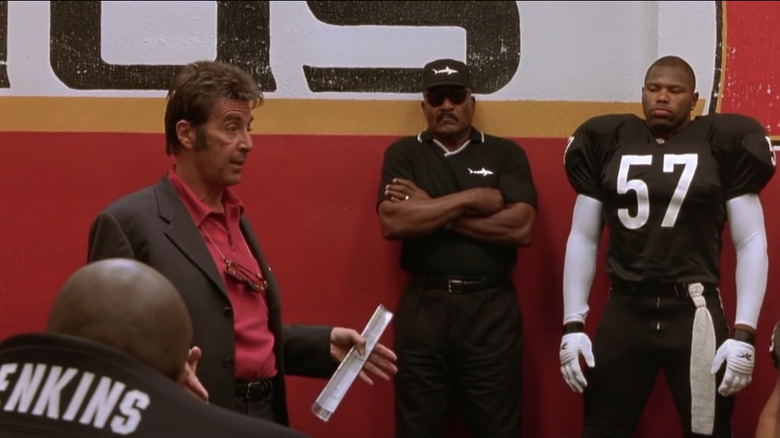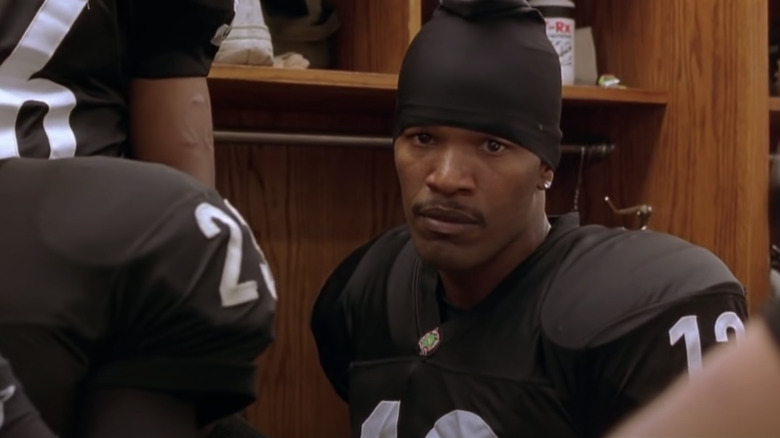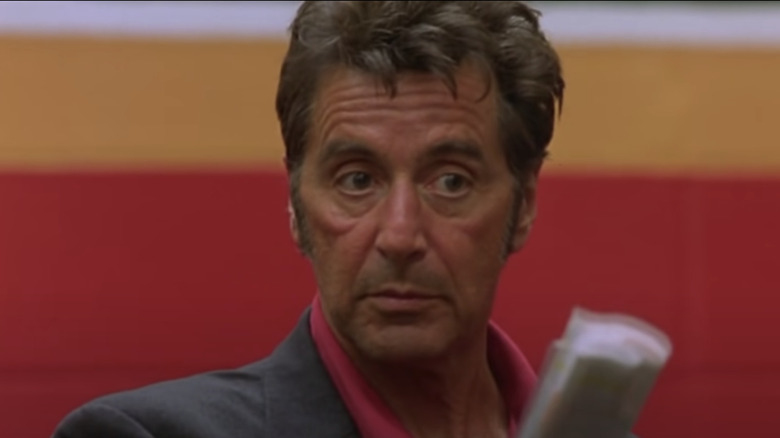Al Pacino's Standout Any Given Sunday Speech Was Deeply Personal To Oliver Stone
Al Pacino chewed some delicious scenery in the late 1990s. Twice at Michael Mann's direction, he excelled as a hard-nosed investigator (Detective Vincent Hanna in "Heat" then journalist Lowell Bergman in "The Insider"). He stole the show from his younger co-stars both in "Donnie Brasco" and "Devil's Advocate," proving youth can't compare with sheer talent.
Pacino's last film of this period was the football drama "Any Given Sunday." He played Tony D'Amato, the aging coach of the Miami Sharks. The film's most famous scene, a motivational speech by D'Amato to his players, is carried entirely by Pacino. The speech as written and Pacino's delivery of it are masterful in their escalation. D'Amato starts weary, telling the players, "We're in hell gentleman." Yet, he manages to describe the grave odds in a way that makes you want to defy them:
"Because in either game, life or football, the margin for error is so small — I mean one-half a step too late, or too early, and you don't quite make it. One-half second too slow, too fast, you don't quite catch it. The inches we need are everywhere around us ... And, either we heal, now, as a team! ... or we will die as individuals. That's football guys. That's all it is."
Pacino's voice goes from raspy to furious along the way. Director Oliver Stone's trademark non-contiguous editing is sometimes distracting but not enough to undermine the performance. According to Stone, he drew on some personal history to write the speech.
Inch by inch
In 2020, Entertainment Weekly published an oral history of "Any Given Sunday." Among those interviewed were Pacino, Stone, and Aaron Eckhart, who played the Sharks' Offensive Coordinator Nick Crozier. Eckhart is seen briefly during the speech scene and in the interview, he described Pacino's delivery as, "unforgettable."
Stone said the thesis of the speech, drawing parallels between struggles in one's chosen game and life itself, was lifted from a speech he gave to film students. The director recounted:
"It was based on a speech I was giving to students when I was making college tours and talking about what happened to me in Vietnam and what happens in the movies. I remember going into the analogy of six inches in front of my face, this combination of war and strategy and your own personal experience and your gut. I wanted to put that into what football is. It's an homage to the difference between getting by and really making it, between winning and losing."
Whether in football or filmmaking, in war or in life, last minute decisions or effort can make all the difference.
Pacino's naturalism
Pacino, for his part, believes he may have changed a few words when delivering the lines, but he didn't change the speech's essence. If anything, that off-the-cuff quality makes his performance even better; the speech doesn't sound rehearsed, but like D'Amato formulating vague thoughts into the words as they come to him. He sometimes pauses a second, contemplating the next word, and he occasionally repeats himself.
D'Amato's self-deprecating detour ("I made every wrong choice a middle-aged man can make ...) adds personality and realism to the speech. Yet, Stone manages to tie this into the speech's message, saying, "You know, when you get old in life things get taken from you. I mean that's...part of life. But, you only learn that when you start losing stuff. You find out life's this game of inches. So is football."
Speaking to EW, Pacino added: "I was grateful it was filmed toward the end. I got to know the guys and where I was coming from. I felt more in it." Even though it's a monologue, Stone doesn't keep the camera static, focused square at Pacino. Instead, he includes several shots of the player's reactions to the words, selling the scene as the communal event it is. The characters, and actors, are clearly as awed in the moment as the audience would be when they watched the scene.


